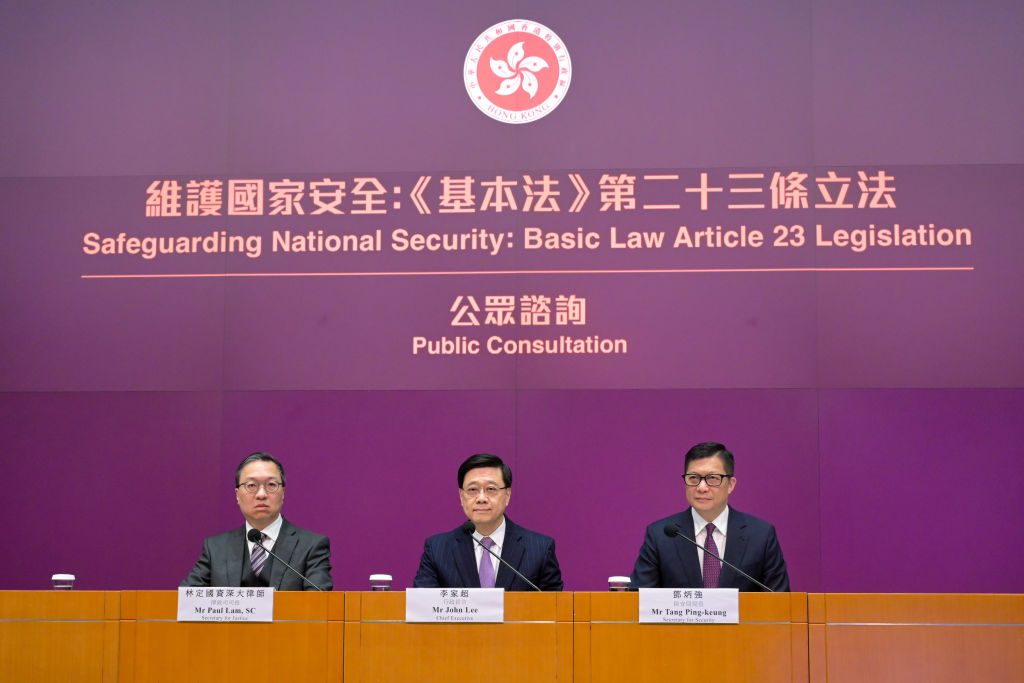Another National Security Crackdown in Hong Kong
Happy Thursday! More than 30 years after they made their debut, the children’s entertainment group “The Wiggles” appointed their first-ever CEO this month. Some may question how it took this long to have someone steering the big red car, but we’re personally unsurprised that the group that brought us “Fruit Salad, Yummy Yummy” was operating purely on vibes this whole time.
Quick Hits: Today’s Top Stories
- National Security Council spokesman John Kirby said Wednesday that U.S. intelligence indicates the Iran-backed Islamic Resistance in Iraq was behind Sunday’s attack on Tower 22 in Jordan that killed three U.S. service members and injured more than three dozen, suggesting that it was possible a group under that umbrella, Kataib Hezbollah, perpetrated the attack—though he stopped short of directly assigning blame to the sub-group. The Islamic Resistance itself has claimed responsibility for the attack. President Joe Biden has not yet responded militarily to the strike, but the White House has suggested the retaliatory actions will come in phases.
- The House of Representatives voted 357-70 on Wednesday night to pass the Tax Relief for American Families and Workers Act, expanding the child tax credit and restoring three business tax cuts. The $78 billion bill—which garnered support from 188 Democrats and 169 Republicans—increases the child tax credit amount while making it easier to qualify, and restores a research tax break that allows companies to recover costs of domestic research and development. The legislation heads next to the Senate, where it faces an uncertain future.
- The Federal Reserve held interest rates steady at a range of 5.25 to 5.5 percent on Wednesday, with Fed Chair Jerome Powell suggesting cuts were unlikely during the next meeting in March but would be possible later this year. “If the economy evolves broadly as expected, it will likely be appropriate to begin dialing back policy restraint at some point this year,” Powell said following the meeting. “But the economy has surprised forecasters in many ways since the pandemic, and ongoing progress toward our 2 percent inflation objective is not assured.”
- Leaders of several Big Tech companies—including Meta, Snap, and TikTok—testified before the Senate Judiciary Committee on Wednesday, where they faced bipartisan criticism from lawmakers for their companies’ alleged role in child exploitation and suicide. Meta CEO Mark Zuckerberg, during a line of questioning by GOP Sen. Josh Hawley of Missouri, apologized directly to parents in the audience of the hearing whose children were harmed by social media. During the hearing, several senators argued in favor of reforming Section 230, which prevents social media companies from being sued for the content on the platforms.
- Online retailer eBay agreed to a $59 million settlement with the Justice Department on Wednesday over allegations that the e-commerce company violated the Controlled Substances Act by illegally selling thousands of pill presses and encapsulating machines. Many of the pill press purchasers, the DOJ alleged, also bought molds, dies, or stamps that could have allowed them to create counterfeit pharmaceuticals. “While eBay acted lawfully and denies the DOJ’s allegations,” the company wrote in a statement, “we determined that this agreement is in the best interest of the company and its shareholders as it avoids the costs, uncertainty and distraction associated with protracted litigation.”
Hong Kong Under China’s Thumb

In the summer of 2019, pro-democracy protests broke out in Hong Kong over plans to allow criminal extradition from the city to mainland China. At the peak of the demonstrations, as many as 1.7 million people—a quarter of the total population—took to the streets. The protests stretched into early 2020 but were brought to a halt by the outset of the pandemic, affording the Chinese Communist Party (CCP) an opportunity to impose a restrictive national security law (NSL) on the city that some described as the end of Hong Kong.
This week, more than three-and-a-half years later, Hong Kong’s chief executive unveiled a new national security law that would build on the crackdown initiated by the 2020 order. The proposal, which will almost certainly be adopted, represents another step toward importing mainland China’s state suppression to …
As a non-paying reader, you are receiving a truncated version of The Morning Dispatch. Our full 1,428-word story on the crackdown in Hong Kong is available in the members-only version of TMD.

Worth Your Time
- Writing for the Free Press, Rupa Subramanya told the story of death row inmate Richard Glossip and his ongoing quest to end capital punishment in Oklahoma. “Glossip has been scheduled to die nine times,” Subramanya wrote. “He’s had three last meals. He’s said farewell to his wife, Lea, five times. And every time, he’s been granted a stay or an appeal—another chance. Now, a quarter-century after being convicted of a murder almost everyone agrees he is not guilty of, his long, tortuous journey is nearing its climax. All of which is to say that, in the not-too-distant future, Glossip, 60, will be dead, or he will be the man who brings down the death penalty in one of the most pro-death penalty states in the country. Or possibly, even, both.”
Presented Without Comment
Politico: House Republican Reported for Doing Pull-Ups at the Top of Capitol Dome
Also Presented Without Comment
CNBC: Judge Dismisses Disney Lawsuit Against Florida Gov. Ron DeSantis Alleging Retaliation
Also Also Presented without Comment
Axios: Congress Tries to Address Surge of Swatting Incidents
“In a letter addressed to congressional spouses, a copy of which was obtained by Axios, House Sergeant at Arms William McFarland wrote that there has been an ‘increased number’ of swatting incidents at members’ personal residences. McFarland said his office ‘will be planning a virtual conference to discuss swatting with congressional staff,’ and—at upcoming party retreats—he will ‘personally be on hand’ to discuss security matters with spouses.”
Toeing the Company Line
- In the newsletters: Scott argued (🔒) vague laws are to blame for Biden’s ability to pause liquefied natural gas exports, Andrew and Drucker reported on an effort to get Democrats and independent voters to vote for Nikki Haley, and Nick wondered (🔒) if the 2024 election vibes are starting to shift.
- On the podcasts: After Sarah and David dive into some Supreme Court gossip on the latest episode of Advisory Opinions, Sarah is joined by Judge John K. Bush of the Sixth Circuit Court of Appeals to discuss the method and merits of the “history and tradition test.” On The Remnant, Jonah talks with Peter Berkowitz, a senior fellow at the Hoover Institution.
- On the site today: Drucker considers whether New Hampshire Gov. Chris Sununu has a GOP future after being Haley’s right-hand man, and Carl Graham explains how the military prepares joint operations.